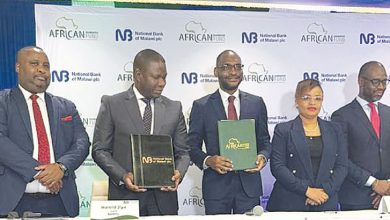Police investigate forex syndicate
Malawi Police Service says it is investigating the sources of money and which banks the five women arrested on suspicion of forex externalisation were involved with.
In an interview on Sunday, national police spokesperson Peter Kalaya said the law enforcing agency suspects there is a syndicate of big businesses, banks and agents that is involved in money laundering and externalising forex.

He said: “Investigations are underway to establish the businesses involved, how long such transactions have been happening and how much was externalised and through which banks, but also the sources of money.”
This follows the arrest of five women at Kamuzu International Airport in Lilongwe last Wednesday who were found with 338 ATM cards suspected to have been used in externalising forex.
Kalaya said the police suspect that the five women were working with big businesses in the country to launder money and externalise forex, and that banks were party to the illegal transactions.
He said: “We suspect that it is a syndicate. Big businesses and banks could be involved in this.”
The police spokesperson, however, said police they are yet to establish how much forex the five women externalised.
Police identified the five as Sellina Mkandawire, 39, of Ng’onga Village, Traditional Autjority (T/A) Chikulamayembe in Rumphi; Fatima Dziko, 35, of Mbomba Village, T/A Mpando in Ntcheu; Diness Mphande, 66, of Mtoole Village, T/A Fukamapiri in Nkhata Bay; Hanifa Osman, 33, of Nkosini Village, T/A Kachindamoto in Dedza; and Angella Mphande, 36, of Mtoole Village, T/A Fukamapiri, Nkhata Bay.
Meanwhile, economic expert Betchani Tchereni, posting on his social media page, feared that more people could be involved in such kind of forex externalisation and money laundering.
In an interview on Sunday, he said when externalisation is done at such a large scale, supply of forex becomes low which in turn leads to devaluation of the kwacha.
“When devaluation happens, people who trade in forex benefit. However, consumers suffer more as they have to pay more for goods,” said Tchereni.
He further observed that this is not the first time that the country has recorded such a case; hence, called for a “very alert Fiscal Police” to curb the malpractice.
Reserve Bank of Malawi (RBM) spokesperson Ralph Tseka expressed concern over the forex externalisation, but he asked for a questionnaire to respond on the matter.
Malawi is struggling with forex challenges, with the country’s forex reserves currently at about one month import cover.
The shortage of forex has made it hard for the country to import strategic commodities such as fuel, fertiliser and medical supplies.



